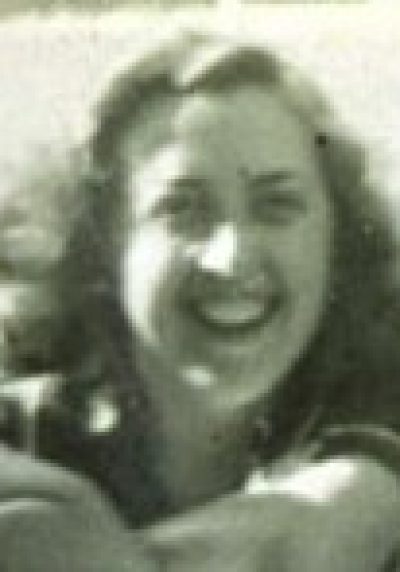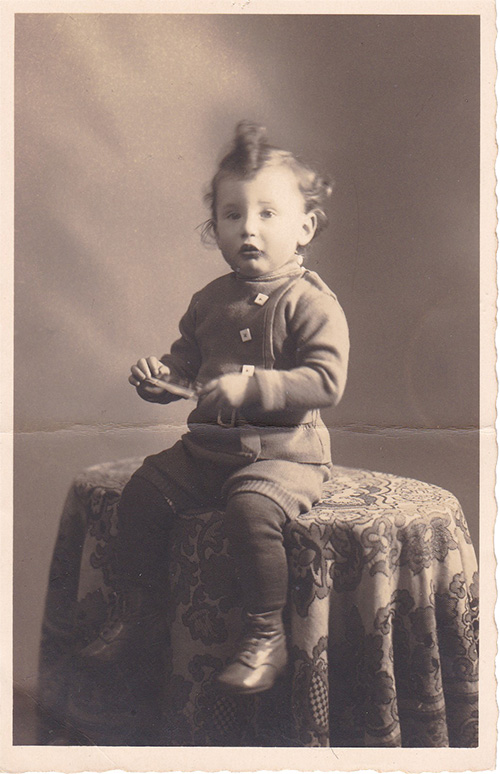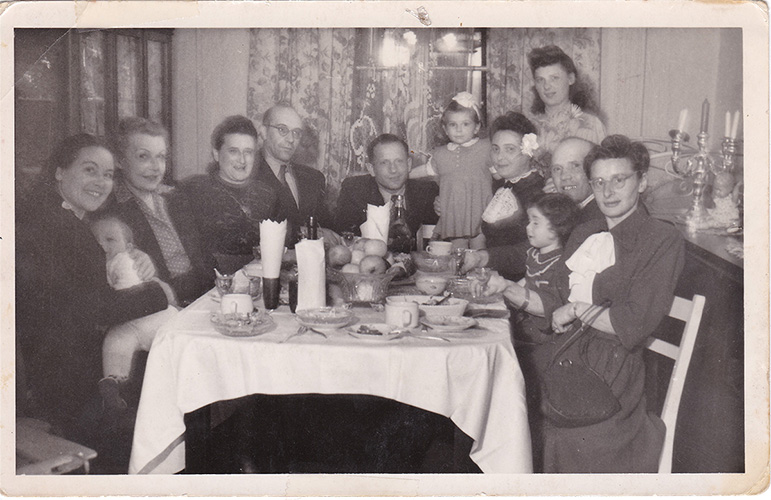Susan Eisenberg Petrov
Biography
Susan Eisenberg’s childhood was full of promise. An only child, she was born in 1924 into a family that proudly traced their Hungarian lineage back a hundred years. She grew up in the small town of Miskolc, where her father had a successful business buying and exporting livestock and grains for a farming cooperative. Her loving and close-knit family gathered after synagogue at her home during Shabbat, sharing cakes, coffee, and tea.
The Jewish community in Miskolc had 2 orthodox synagogues, but the Petrov’s practiced a more liberal, reform Judaism and were well integrated into Hungarian society. Trouble began in 1938 with a small Nazi party that grew in strength, paralleling the party’s growth in Germany.
Hitler invaded the Soviet Union in 1941 and demanded that Hungary join the war. Susan’s father, an outspoken WWI veteran, was taken to a work camp. Her uncle died when he was forced to walk with others into a minefield between the German and Russian armies to test the presence of mines. Her father was released from the work camp in 1942, but was ill and depressed and died that year at the age of 44. After her father’s death, Susan moved with her mother to Budapest to live with relatives.
Although the Jews in Hungary suffered under tightening restrictions, Hungary’s regent, Miklós Horthy, protected them for a time from much of what was happening. That protection fell apart in March of 1944 when the Germans occupied and seized control of the country.
Many members of Susan’s family were taken to the concentration camp of Thersienstadt. All perished there.
In Budapest, the British, Russians, and Americans regularly bombed the city. Jews were required to wear a yellow star and live in designated “yellow star” housing. Restrictions dictated when they could leave the house, and they were forbidden to go to public parks or walk on the sidewalks. Susan was very defiant and often removed her star in order to go into the country for food – her blonde hair and blue eyes did not betray her.
When the Russians approached Budapest, the Hungarian Nazis ordered Susan’s Jewish age group to report to the soccer field for labor. They dug trenches to try to prevent Russian tank advancement. The guards, some 14-15 years old, shot anyone who hesitated in their work. As the Russians came closer, Susan’s group retreated, traveling for two days and nights in the cold and rain, with no food. The guards ran them back to Budapest to work in a brick factory, where she met two girls who would become dear friends, Ferry (Ferike Csato) and Kati (Katherine Goldstein).
Susan escaped the brick factory by faking a broken leg and arm, and joining a group of sick and injured who were being taken to Budapest to be killed. Hungarian gendarmes caught up with her in Budapest and she was marched with thousands to Hegyeshalom on the German border. Although her friends had obtained a Wallenberg passport for her, Susan never saw it. That passport ended up saving her aunt and uncle instead.
In October of 1944, they were jammed into cattle cars. After days of misery, the trains arrived at the Dachau subcamp of Kaufering. Susan and her two friends, Ferry and Kati, were given striped uniforms. About 500 people lived in each barrack with a block leader in charge. Food came once a day in a big wooden barrel with hot water and big hunks of sugar beets.
Each day, they were called out to stand in the cold to be counted and given their work assignment. Susan’s first job was in the kitchen (a preferred position so she was not tattooed), then the Holzmann commando outside of Landsberg and Augsburg, cutting wood, then the Mohl commando carrying cement bags to build an underground airplane hangar, then a dynamite factory. Survival, Susan knew, depended on not allowing yourself to feel and thinking only of the moment.
In April 1945, she and her friends were taken from Kaufering to the main camp of Dachau. They spent a night in the showers, believing they were to be killed in the crematoriums. But the next morning about 5,000 young people were marched out of the camp, walking at night and hiding in the woods during the day, headed for the mountains where they were to be killed. Susan was sick and feverish, held upright by her friends.
Five days later, what was left of their group arrived at a work camp for Russian prisoners in the small German town of Wolfratshausen, where they were liberated by the American Third Army. After slowly regaining their strength, without any assistance from the Americans, Susan, Katherine and Ferry returned to Budapest to find it devastated. Susan couldn’t locate her house in the rubble. Inflation made money worthless.
Susan and her friends accompanied Israeli agents and fifty Polish Jewish children on a long, harrowing journey across Hungary back to Germany, covering 200 miles on foot. At one point, they had to run from Russian gunfire.
Susan lived in Germany for three years, then married a Christian GI from Indiana and came to America in 1948, becoming a US citizen. Her two children were born in Long Island, New York. Struggling with multiple health issues, Susan worked in various factories to pay her medical bills before getting a clerical job at Mitchell Air Force Base, a job that turned into a civil service career of 30 years. Susan was able to bring her mother to New York in May 1956.
Susan divorced and married a Canadian man, moving to Montgomery, Alabama when her husband was transferred to Maxwell Air Force Base. Ferry and Katherine joined relatives in America, and the three friends kept in touch.
Susan Eisenberg Petrov died in Montgomery, Alabama in 2008.
More Information
? Ross
James (Jim) Petrov
Dachau (Kaufering/Landsberg), October 1944
Marched nearly 100 miles with a group of Hungarian Jews from Budapest to Hegyeshalom, Hungary
Marched from Dachau to Wolfrathausen just before liberation
Wolfratshausen, Germany
Regensburg
Resources
-
History & Related Resources
Testimony
November 12, 1990 / Montgomery, AL
Interviewer: Louisa H. Weinrib



